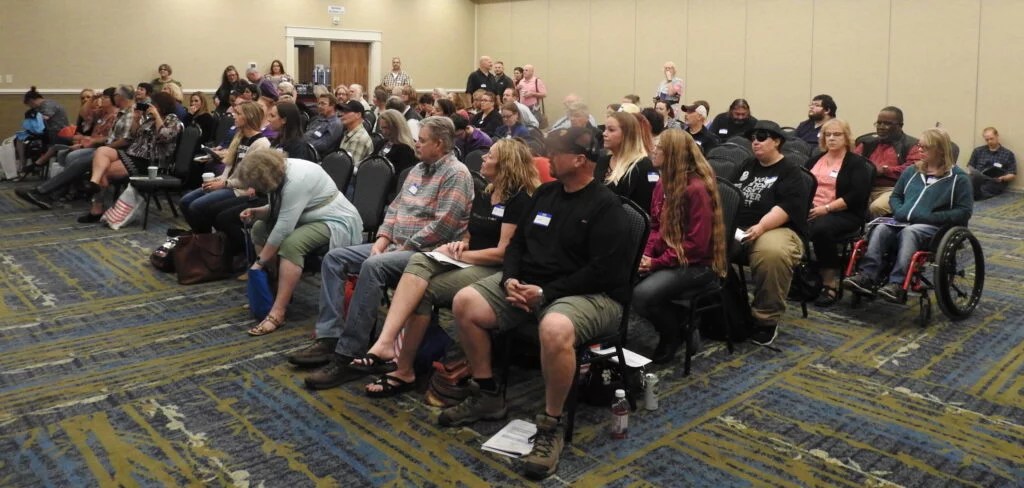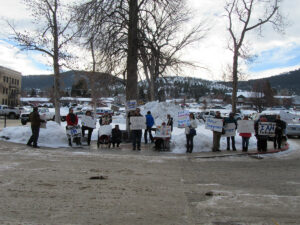We are a network of individuals who are on the path of recovery.
We identify as being in recovery from mental health, substance abuse and or addiction struggles. Together we share information, provide peer support, advocate with a united voice and improve the system. We come from places all across Montana, with different stories and experiences but together we make a difference. This is the Recovery Movement in Montana.


Realizing Recovery Blog
Unconditional Love in Recovery
Unconditional love is something I have been blessed to have in abundance in my life. A year ago, my mother passed away, and about six months ago I had a realization. It hit me like a brick on a tearful ride home in the car. Part of the reason for my continual heartache in regards of losing her was that for 48 years, I was blessed with unconditional love on a daily basis. I was not just grieving the loss of my mother, her “being” and friendship, I was grieving for the loss of her constant unconditional love that kept me strong. I was craving it and wanted it back!
True Leadership
Growing up in a family of overachievers and natural-born leaders, allowed me to see what positive leadership can look like. Watching my grandpa Blackie Wetzel be such a humble person, set the tone for my dad and his siblings, to also be some amazing individuals too.
It wasn’t until I owned my own business at the young age of 19, that I realized that I too had some natural skills that gave me an edge over the competition.
The Transformative Power of Storytelling
In the rich tapestry of Native American traditions, storytelling stands as a sacred gift, a conduit for the transfer of wisdom, healing, and positive energies. Our Blackfoot people have a deep-rooted connection to tradition.
I share my life experiences and provide a compelling narrative as a Blackfoot woman in recovery. My story is not just a personal account; it’s a gift from Creator. There is a transformative power of sharing experiences, bridging the metaphysical and physical worlds by preserving true history for future generations. In the intricate dance between the past and the present, my journey unfolds, offering insights into the resilience that storytelling can foster.
The Pursuit of Happiness
The pursuit of happiness can feel like hunting for an external thing that, when destroyed, justifies the means. Mind you, this perspective comes from a Vegetarian who insists on achieving balance through less sacrificial means. There are two ways to view the world we live in. The first is objective, survival of the fittest, which proclaims intellect is almighty and whoever thinks and runs faster wins. The second approach comes from “Namaste,” which means “the God in me recognizes the God in you.” This is not only from human to human but also from human to object. Recovery cleared this up for me, creating a space in my heart for the value of all living things as a way of life.
Vision Boards
If you don’t have a vision and you’re struggling to pinpoint what you want and where you want to go, it can be hard to be inspired and visualize your destiny. Without a clear vision, it’s hard to direct your efforts in ways that serve your goals. It’s also hard to attract the support and resources you need. That’s where a vision board comes in.
The Strength of Being an Introvert
I am introverted. People who know me are often surprised by that because I am an actor in a theatre company and am quite comfortable speaking in front of people. I often am seen as bubbly in social situations in which I am comfortable. Introversion is sometimes seen as shyness or anxiety around people but that isn’t necessarily accurate. Am I shy around people? I am quite shy around people I don’t know very well. I do have social anxiety, so I sometimes am viewed as not liking people. These factors aren’t directly related to my introversion, though. My parents sometimes worried about how much time I spent alone and would try to coax me out of my room to spend time with the family. This was rarely a positive experience.
Celebrating the New Year in Recovery
Celebrations that generally revolve around alcohol may be difficult for people in recovery and a good number of New Year’s Eve celebrations do just that. Toasting the new year with champagne is a staple for many celebrations. For those in recovery or who just prefer substance free New Year’s celebrations, it can be difficult to find activities. You can always host your own events but many of us hosted events just a few days ago and the thought of hosting another can be overwhelming.
Behavioral Health Stigma as a Human Rights Issue
The discourse on human rights in mental health has gained significant momentum in recent years as societies around the world grapple with the challenges of fostering an environment that respects the dignity and autonomy of individuals facing mental health issues. One of the factors affecting this is the stigma associated with mental illness.
Stigmatization of mental health conditions remains a pervasive issue, impeding the full realization of human rights for individuals in this context. Stigma often manifests as discrimination, prejudice, or stereotyping, exacerbating the challenges faced by those seeking mental health support. This stigma not only impacts individuals’ access to treatment and employment but also perpetuates a culture of silence and shame surrounding mental health.
Human Rights When It Comes to Mental Health
When I began this article, I was going to write about involuntary commitment, in particular for young adult children by their parents. But after spending hours writing and talking to others, I was more confused than when I started. I was left with more questions than answers. And maybe that’s how it should be. Maybe we should wrestle with it. Maybe there is no right or wrong stance but many answers that depend on numerous variables.
Embracing the Grinch
I am a “grinch.” Originally, that was a title given to me by people around me. Specifically when I worked at an early childhood program and had small children of my own. I do not enjoy the holidays. There were many years that we didn’t put up a Christmas tree and when my co-workers heard me say that, they acted as if I was severely neglecting my children. We aren’t a religious family so we really only celebrated Christmas as a secular holiday. I enjoyed Christmas Day as a kid. It was predictable. Christmas Eve was different. We spent Christmas eve with my dad’s family and Christmas Day with my mom’s family. My grandpa on my mom’s side loved decorating for the holidays and genuinely enjoyed Christmas so it was fun to be there. Celebrations with my dad’s extended family were always focused around alcohol and were not enjoyable. Inevitably, some family members would have a disagreement that resulted in loud arguments which were scary as a young child but I got to spend time with my great grandma who I adored so I could sometimes block out the other stuff. When my great grandma moved into a nursing home, those larger family gatherings ended and we would visit her on holidays. It was easy to leave when more people showed up because there simply wasn’t enough space in her room for several people.
Advocacy
Check out our new page dedicated to tracking state and federal bills, executive orders, and lawsuits.
 Standing up for what we believe is right, having a voice, making choices in recovery, and sharing our own recovery story are some of the things that make up advocacy and self-advocacy.
Standing up for what we believe is right, having a voice, making choices in recovery, and sharing our own recovery story are some of the things that make up advocacy and self-advocacy.
Let’s start with self-advocacy which refers to an individual’s ability to effectively communicate, convey, negotiate, or assert his/her own interests, desires, needs, or rights. It involves making informed decisions and taking responsibility for those decisions (Van Reusen et al., 1994).
Knowing yourself and your strengths, needs, and interests is the first step toward advocating for your rights. Once we begin to find our way on the path of recovery, we may want to begin to advocate for ourselves with those around us—peer supporters, friends, family, service providers, and doctors. These conversations may be difficult, but having them is vital to your recovery. Remember, you are the expert on yourself.
It may be that prior to getting on the path to recovery, others were making decisions for you or acting in what they believed to be your best interest. Now may be the time for you to let others know what you believe to be in your best interest. You may find yourself in the process of taking control and making decisions affecting your life and perhaps others’ lives. This process of self-determination means making informed choices, problem solving, setting and attaining goals—essentially being a self-advocate.
Advocacy or advocating for others may be something you are interested in doing. Advocating for another person isn’t about acting in a person’s perceived best interest, but it is standing with a person to ensure they are able to articulate and obtain what they want or need. Perhaps you may consider speaking up and advocating for various changes in the services in your community.
Here are a few examples of advocacy:
- Speak to your legislature or a special committee.
- Get involved with an advocacy group or organization.
- Share your recovery story to support others in recovery.
- Whether advocating for yourself, for others, for your community, or as part of an organization, advocacy is very self-empowering. You can make a real difference in your life, the lives of others, and even the community.
- Reach out to Montana’s Peer Network and share your recovery story on one of our “Recovery Talks” podcasts.
Advancing Advocacy Blog
May is Mental Health Awareness Month!
Check out stickers and other resources for Mental Health Awareness Month and Children’s Mental Health Acceptance Week!
Forms of Advocacy
There are many different forms of advocacy, let me take you on my journey with advocacy. My recovery began in 2007 however I was being advocated for as early as 2003.



